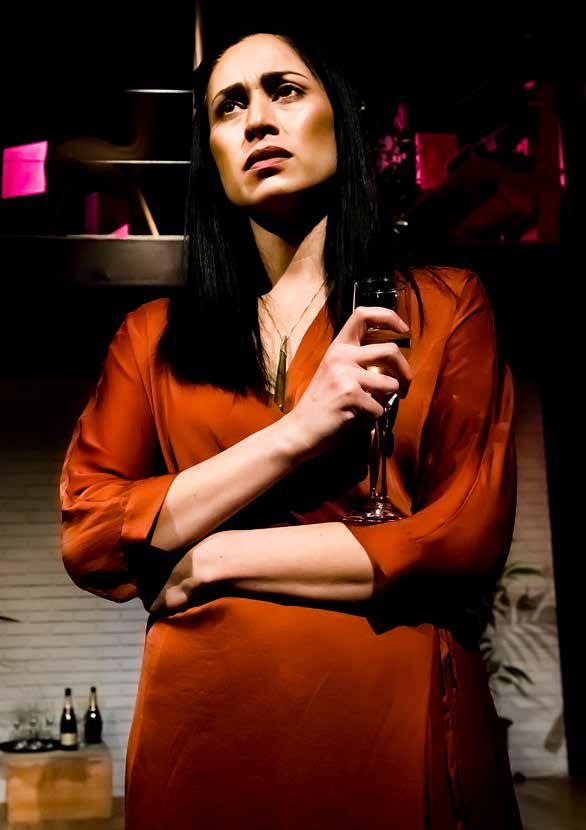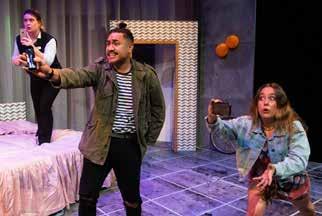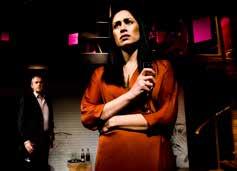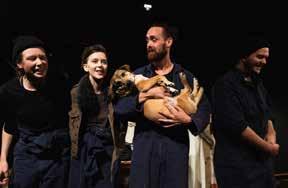
9 minute read
WELLINGTON ROUND UP
WELLINGTON
BY JAMES WENLEY
Advertisement
There’s this moment in NZ Festival’s Mám (Michael Keegan-Dolan): a performer bestows a kiss on the lips of another in the company, who accepts it with rapture. The kiss then cascades around the ensemble, blissfully transforming each receiver. There’s an innocence in the freewheeling sexuality, a shared intimacy, a sublime liberation. Within a week, my recollection of this image turned it into something terrible, foolish, dangerous, as we began to question the safety of festival-going and close contact. On the Saturday, I smugly watched work-inprogress The Brief and Frightening Reign of Phil, the new musical from Bret McKenzie and the UK’s National Theatre about the George Saunders character whose brain literally falls off whenever he goes off on a narrow-minded rant and is elevated to leader. How relevant to the current political climate! How great to be able to claim that when this becomes a big West End and Broadway hit, we saw it here first! On the Sunday – the festival’s final day – all tickets were cancelled. I didn’t get to see Strasbourg 1518, but I imagine that its investigation of a mysterious dancing plague would not have played as mere historical footnote. Our theatre had received its first unwanted kiss with a modern pandemic. The NZ Fringe still had a week to go, celebrating a milestone birthday with its “Fringe is thirty, Fringe is flirty” tagline. And it sure got its flirt on, with a bumper year of 150 plus productions. Jean Sergent told us how to Change Your Own Life, Jonny Potts’ guided us through Wellington’s lost landscape of video stores in The Best Show in Town is at Your Place Every Night, Acts of Kindness questioned what makes a LEGEND, and Party at Mine – a digital performance for Instagram – proved ahead of the curve. But we also found ourselves flirting with another presence, and both performing and theatregoing became an ethical conundrum as shows were cancelled and physical distancing and tracing measures unevenly implemented. Three days after the Fringe awards were livestreamed, Aotearoa was in lockdown and live theatre came to an enforced and devastating halt. Memories of performances over the previous months would have to nurture us instead, like Circa’s Burn Her by Sam Brooks, Wonderful by Dean Parker, Dave Armstrong’s electionyear salvo The Surprise Party, and a long overdue posthumous production of Michele Amas’ The Pink Hammer. Director Shane Bosher brought us Cock by Mike Bartlett and went indoors for Summer Shakespeare’s A Midsummer Night’s Dream. Red Scare debuted Four Nights in the Green Barrow Pub by Kieran Craft, making homely use of JJ Murphy & Co. Ransom from Stella Reid and Neenah Dekkers-Reihana took audience members three at a time through the secret areas of BATS in a confrontation with white supremacy. Playing alongside the The Royal Commission of Inquiry into Abuse in Care, The Conch’s A Boy Called Piano offered the powerful testimony of Fa'amoana John Luafutu’s story with heart-wrenching immediacy. Victor Rodger followed an intense season of Club Paradiso with Uma Lava. Uma Lava is another that would play differently now.




OUR THEATRE HAD RECEIVED ITS FIRST UNWANTED KISS

CLOCKWISE FROM TOP LEFT: The Surprise Party by Dave Armstrong, Circa Theatre. Image: Paul McLaughlin.
Small Town by Michael Lloyd and Shona Jaunas, Circle of Fifths, Te Raukura ki Kāpiti. Image: Moments of Light Photography.
Breaks by Ben Wilson, Long Cloud Youth Theatre, Te Whaea: National Dance and Drama Centre. Image: Philip Merry.
A Traveller’s Guide to Turkish Dogs by Barnaby Olson and company, Circa Theatre. Image: Roc+ Photography.
Sorry for your Loss by Cian Gardener, Circa Theatre. Image: Michael Smith.
Ngā Manu Rōreka by Apirana Taylor, translated into te reo Māori by Materoa Haenga, Taki Rua Productions. Image: Philip Merry.
ABOVE: The Swing by Helen Pearse-Otene, Te Rākau Hua O Te Wao Tapu Trust, Massey University Drama Lab. Image: Aneta Pond.
PREVIOUS PAGE: Burn Her by Sam Brooks, Circa Theatre. Image: Philip Merry. Quietly revolutionary was the NZ Festival’s choice to throw open its 2020 programming to three guest curators. Whilst in some ways a bargain move to programme more work from each artist, it lent each week a welcome idiosyncrasy: the grand and beguiling statements of Lemi Ponifasio and MAU, the transcendence of Laurie Anderson, the whimsy of Bret McKenzie. But then this momentum was halted. Or at least redirected. I think about the shows that I might otherwise have been writing about here. Circa’s Things I Know to be True, Winding Up, Hir… A second Second Unit. BATS resolved that even if its physical space was temporarily off-limits, it would remain an online home for artists. Early on it led the charge in live streaming – with its Fringe season cut short, Hugo Grrrl’s empowering Princess Boy Wonder was beamed to a larger audience than the random stage could seat. Cancelled USA touring show Butcher Holler Here We Come became BATS’ first ‘on demand’ video production. Binge Culture dusted off their banana suits for a five-hour lockdown Zoom edition of Break-Up. Circa Theatre commissioned Trick of the Light’s zoom horror It’s Behind You! and Te Rēhia’s Found in Translation, whilst actor Jack Buchanan went viral (the good kind!) with Family Lockdown Boogie (google it!). For all the comfort these familiar faces provided online while theatres were closed, it was a relief to return to Circa for the postponed season of Thomas Monckton’s The Artist. On my night a child responded with vocal delight at each of Monckton’s physical tricks, becoming a special running gag of its own. I felt like I too was seeing this show through the eyes of a child, full of the wonder of liveness. Oh yeah, this is what I have missed, this is what only live theatre can do. And how remarkable, that in that month of June, Pōneke was one of the few places in the world where you could safely experience this.
Why I wrote the play I wrote
COURTNEY ROSE BROWN on The First Time
I wrote The First Time after I quit my 50 hours a week hospo job back in 2015. I told my boss that the arts were calling me, dug into my savings to buy a Macbook, and started writing. I wrote freely without filtering. It was exhilarating. I had finished uni, moved in with my best friend after leaving a traumatic flat, and was excited about life for the first time in a while. I had two Fringe shows I was working on. It felt like a good step forward in being an artist. I sashayed around in my ill-fitting op-shopped vintage looks and newly-perfected winged eyeliner, but I had not invested yet in being able to properly see. With purple lips and misplaced enthusiasm, I threw myself into everything creative I could. I obsessively started archiving my life in poetry which I shared at a few open mics, fundraiser gigs and with friends. I had a lot of young women reach out to me and say that they’d had the same experiences and were stoked to see them shared, for the first time. Hearing this again and again made me realise someone needed to create content about young women that we wanted to see. Why not me? I started writing a monologue for a character Alana first as a fun, self-imposed exercise about the firsts in a relationship. The cynic I was at the time knew the romance would end badly. I played a lot with text language and self-obsession, honing in on a stereotype of a young female, knowing that at the core, Alana was a very kind and caring character. With her LOLs and WTFs and AFs I wanted people to challenge their first thoughts, and why they thought less of her. Once I had finished Alana’s story, I started on Jess, who I knew would be the exact opposite. I had fun playing off their differences: Jess, a queer, outspoken perfectionist, a feminist. Through Jess I wanted to explore feminism, and how you can be ‘woke’ about some things, and less about others. Jess was clued up on all the lingo: toxic masculinity etc. Yet she was clueless about mental health. This was an important thing for me to explore. At the time everyone I loved was depressed. The year before I had worked on a verbatim show called Well, a play about mental health with Women Aren’t Wolves Productions. I spent hours transcribing interviews and I was struck with how differently everyone spoke. Part of my exercise now was to experiment with different ways of talking. It tied in with my transition from growing up in the Hutt to moving into town. I wanted the

NO MATTER HOW SMALL IT MAY SEEM, A WIN IS A WIN
script to reflect the experiences that I and those around me had had. During my first year at uni, I didn’t realise that some high schools went to Europe in year 13 (we went to Rotorua), nor how having a Macbook was the ultimate status symbol. I didn’t realise how strong my Hutt drawl was. How people who’d never been to the Hutt clocked on to it as ‘a bad place’. I experimented with an English accent without going to England, and worked hard at using grammar correctly when I spoke, while figuring out the hot words that everyone was flinging around: ‘emulate’, ‘aesthetic’ and ‘organic’. Organic was a particularly funny one for me. I had never thought about how a process could be forced, or about how food could be organic. Writing The First Time, was a way for me to reclaim ownership over language, and push through shame. At this stage, I was a black sheep in my home, having found Jesus in my heart. I went to church several times a week. I didn’t drink, or swear or do any of the fun things that first years were getting up to. A lot changed over my time at uni. Classic. Writing The First Time was a way for me to process the changes and also validate young female experiences. A funny thing was that one of the characters, Mereana experienced a heap of things that I hadn’t, but in the future I then did. In fact I went through a phase where I stopped writing ‘cause I was low-key scared that I would write the future into being, and all I wanted to write was black comedies lol. I never had my heart broken, and I didn’t feel like I needed to ‘come out’. I felt like through Mereana processing it, I was able to as well. At that time I was deeply in denial about being depressed and queer. I wanted the script to show many perspectives, and not preach about a single stance. I wanted to show growth and the complexities of women. Elle, who I played in the premiere production, was anxious-as, but had no frame of reference for it. She also experienced sexual assault. At the start I wanted her to believe it was her fault, as so many people do. Each character was able to figure out what they believed in. In the end I wanted Elle to have her victory; for her last ‘first’ to be being able to catch the bus by herself. The show ended on a win. No matter how small it may seem, a win is a win.
ABOVE: The First Time by Courtney Rose Brown, Circa Theatre, 2017. Image: Holly Neill.









